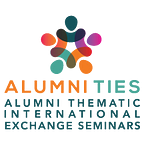I Didn’t Know I Had a Voice and My Voice is My Power
A look into the project, “Media Literacy: Building Capacity and Social Empowerment of Girls”
By Shakhodat Saibnazarova
They gathered in a room, wondering about the next four weeks. They applied to the program mainly because they wanted some social interaction beyond school, but they were unfamiliar with the term “media literacy.” What would the next four weeks have in store for them?
The idea of this project came to us quite randomly. At the Alumni TIES seminar in Almaty, Kazakhstan in November 2019, we realized that media literacy education for teenage girls is not covered by any program in Tajikistan, yet this group is one of the most vulnerable segments of the population. Teenage girls often become victims of sexual and gender-based violence and are not aware of the risks around them. Funded through an Alumni TIES small grant from the U.S. Department of State, our project, “Media Literacy: Building Capacity and Social Empowerment of Girls” aims to build the capacity of girls to express their opinions and contribute to building a socio-economic environment that enables young girls to achieve greater protection from sexual and gender-based violence. The main focus of the project is to increase the girls’ skills to counter deliberately propagated false information on issues negatively affecting people’s perceptions, behavior, and decision-making. To help teenage girls counter false information in the media and become aware of sexual and gender-based violence, we decided to teach technical media skills within the framework of female empowerment.
The project was initially planned for February 2020, but then the COVID-19 pandemic happened, and it changed the entire dynamics of the country. We postponed the project until October 2020 because we did not want to risk the health and life of our participants. We decided to still conduct the training in-person due to limited internet access in the target communities. In addition, sensitive emotions can only be conveyed face-to-face and not in a virtual environment. COVID-19 left many girls in isolation and it was important to thread elements of psychological support and recovery throughout the project. We are currently in the middle of a project and are convinced that the in-person approach was the right one. To date, we have conducted eight workshops in Dushanbe for 30 girls, ages 15–18, with more workshops planned for early 2021.
Our daily workshops were divided into two parts. The first half of the day was dedicated to media and digital literacy. The second part of the day was focused on girls’ empowerment. The trainers taught the girls how to critically read the news by verifying the authors of articles and asking the questions that journalists ask themselves to create fact-checked material. In addition, the trainers taught the participants how to identify bias, manipulation, assumptions, and stereotypes, and how these devices construe and distort information. The participants in the training (10th and 11th-grade students) learned about what happens in a newsroom — how information is prepared, the rules of ethical journalism, and the mistakes that can be made in the process. They also discussed how vulnerable they are to false information and how to track it in media sources.
During the second half of the day, we focused on girls’ empowerment and used Bill and Melinda Gates Girls’ empowerment framework, focusing on recognizing the girls’ power and voice, and equipping them with decision-making tools. Through this framework, the participants learned how to set goals, critically access their goals, and communicate their goals effectively. The participants mentioned that by the end of the workshop, they learned how to inform their parents about their career choices, which are often dictated by parents in our society. Also, we incorporated a session on the concepts of diversity and pluralism. At the end of the workshop day, the participants mentioned how they are more tolerant of their classmates’ ideas, even when they do not fully agree with them. Time for reflection and processing were important elements of the workshops. The participants were each given a daily diary, which they had to complete after each session. The daily diary helped them to reflect on their work and track progress. To create a social network and collaboration tool for the participants, we created WhatsApp, Facebook, and Instagram groups. The project team uses these platforms to share resources with the participant group and the girls use these groups to connect with one another and engage in team activities.
We can say with confidence that these workshops empowered the girls, changed their behavior, and helped to protect them from sexual and gender-based violence. The girls came out of the room with a stronger voice and clarity about their goals. “You are what you are made of” was their motto and they now have stronger images of themselves, motivated to change the world.
Media Literacy: Building Capacity and Social Empowerment of Girls is funded through an Alumni TIES small grant from the U.S. Department of State.
